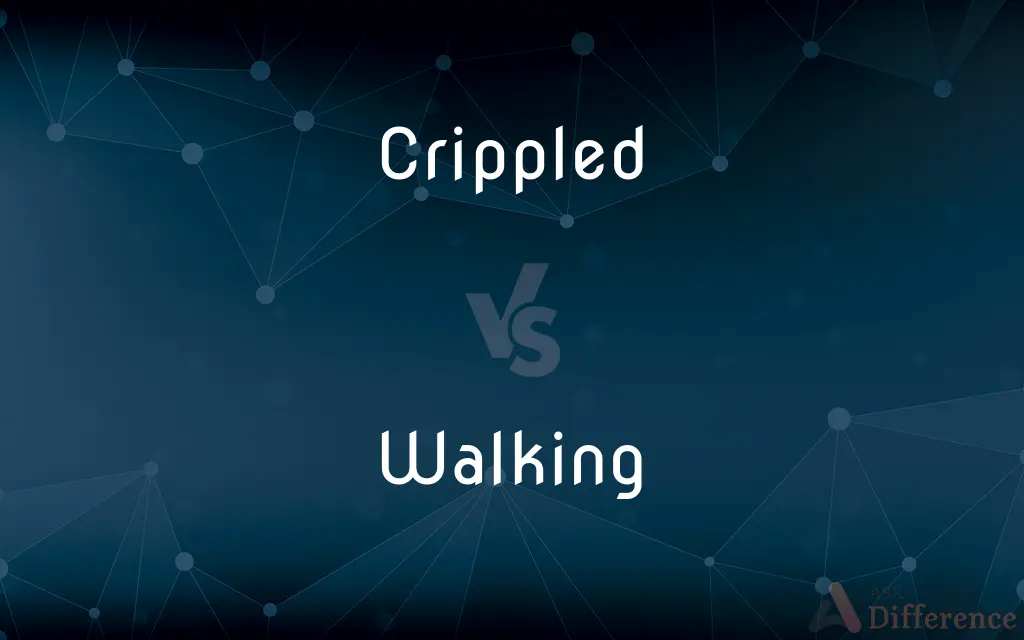Crippled vs. Walking — What's the Difference?
By Tayyaba Rehman — Published on October 2, 2023
"Crippled" denotes having a disability or impairment, particularly relating to mobility, whereas "walking" refers to the action of moving on foot, a basic form of locomotion.

Difference Between Crippled and Walking
Table of Contents
ADVERTISEMENT
Key Differences
"Crippled" and "walking" represent contrasting concepts, with "crippled" often describing a condition that impairs or limits one’s ability to move, especially walk, while "walking" is the very act of moving on foot. "Crippled" is a term traditionally used to describe individuals with physical disabilities, particularly those affecting mobility, conveying a state of being hindered or restrained in movement. "Walking," however, symbolizes movement, freedom, and ability, representing the act of moving one’s legs to travel from one place to another, a fundamental human ability and form of exercise.
The term "crippled" is now largely considered outdated and offensive, as it can imply a reduced or limited state of being, often used historically to denote physical disabilities affecting movement. It conveys a sense of limitation, restriction, or inability, primarily regarding mobility. "Walking," in contrast, implies capability, action, and movement, symbolizing one’s ability to move independently, to traverse, to explore, suggesting an inherent freedom and functionality in moving from place to place on foot.
"Crippled" as a descriptor, implies a significant impairment or limitation, focusing on what one cannot do or has difficulty doing, especially regarding mobility. It often emphasizes the challenges or restrictions faced by individuals with physical disabilities. "Walking," conversely, signifies the act of moving by foot, emphasizing the ability to move, to proceed, to advance, and it's a universal action, an everyday activity that many people are capable of performing without issue.
"Crippled" reflects a state or condition where normal function, particularly in mobility, is lost or reduced, emphasizing the lack or loss of abilities. It is a term that underscores restrictions, limitations, and challenges faced due to physical impairments. "Walking," however, is a representation of action and movement, a basic form of human locomotion, allowing individuals to travel, explore, and exercise by moving their legs in a coordinated manner.
Comparison Chart
Definition
Having a disability or impairment affecting mobility
The action of moving on foot
ADVERTISEMENT
Connotation
Negative, implies limitation and restriction
Neutral, implies ability and movement
Usage
Outdated and considered offensive
Common and universally understood
Focus
On limitation and inability
On capability and action
Implication
Loss or reduction of normal function
Basic, everyday form of human locomotion
Compare with Definitions
Crippled
Crippled means being hindered or restricted in movement or functionality.
The once vibrant town was now crippled by poverty and neglect.
Walking
Walking means moving on foot, lifting, and setting down each foot in turn.
Walking is a simple but effective form of exercise.
Crippled
Crippled denotes being impaired or limited in ability, especially in terms of movement.
The crippled dog struggled to keep up with its more agile companions.
Walking
Walking signifies the act of moving forward by stepping with the legs.
We spent the day walking around the historic district.
Crippled
Crippled describes a state of having physical limitations or impairments.
The crippled plant showed no signs of recovery after the storm.
Walking
Walking implies progressing or advancing at a moderate pace by foot.
Walking through the museum took the entire afternoon.
Crippled
Crippled refers to being unable to walk or move properly due to disability or injury.
The accident left him crippled, reliant on a wheelchair for mobility.
Walking
Walking (also known as ambulation) is one of the main gaits of terrestrial locomotion among legged animals. Walking is typically slower than running and other gaits.
Crippled
Often Offensive A person who is partially disabled or unable to use one or more limbs.
Walking
Able to walk, especially in spite of injury or illness.
Crippled
A nonhuman animal that is partially disabled or unable to use one or more limbs
Cannot race a horse that is a cripple.
Walking
Regarded as having the capabilities or qualities of a specified object
A teacher who is a walking dictionary.
Crippled
A damaged or defective object or device
“He ... would let that cripple of a steamboat get the upper hand of him in a minute” (Joseph Conrad).
Walking
Used, intended, or suitable for walking
Walking clothes.
A walking trail.
Walking distance.
Crippled
To cause to lose the use of a limb or limbs.
Walking
Marked by the act of walking
A walking trip.
Crippled
To disable, damage, or impair the functioning of
A strike that crippled the factory.
Walking
Guided by a person who walks alongside. Used of a machine or farming tool.
Crippled
Having a less than fully functional limb, or injuries which prevent full mobility.
Walking
The action of one that walks.
Crippled
Having any difficulty or impediment which can be likened to a crippling injury.
Walking
The state of the surface on which one walks
The walking was treacherous after the ice storm.
Crippled
Simple past tense and past participle of cripple
Walking
Present participle of walk
Crippled
Lamed; lame; disabled; impeded.
Walking
Incarnate as a human; living.
Elizabeth knows so many words that they call her the walking dictionary.
Phil's mother is a walking miracle after surviving that accident.
Crippled
Disabled in the feet or legs;
A crippled soldier
A game leg
Walking
Able to walk in spite of injury or sickness.
Crippled
Crippled implies a significant loss or reduction of normal function or ability.
A crippling disease had left the artist unable to hold a brush.
Walking
Characterized by or suitable for walking.
A walking tour
Good walking shoes
Walking
Heavily characterized by some given quality.
She was a walking example of how fitness training can take you a long way.
Walking
Gerund of walk.
Walking
The act of traveling by foot;
Walking is a healthy form of exercise
Walking
Close enough to be walked to;
Walking distance
The factory with the big parking lot...is more convenient than the walk-to factory
Walking
Walking refers to the action of moving along on foot at a steady pace.
He enjoys walking in the park every morning.
Walking
Walking denotes the act of traveling or moving from place to place by foot.
She prefers walking to driving in the city.
Common Curiosities
Does "crippled" imply a restriction or limitation?
Yes, "crippled" implies a significant restriction or limitation, especially in mobility.
What does "crippled" generally refer to?
"Crippled" generally refers to having a disability or impairment, often affecting mobility.
Can "walking" also represent slow progress?
Yes, "walking" can metaphorically represent making slow or steady progress.
Is "crippled" considered an appropriate term today?
No, "crippled" is considered outdated and offensive; "person with a disability" is preferred.
Does "crippled" focus on what one cannot do?
Yes, "crippled" often emphasizes limitations, focusing on challenges and what one cannot do or has difficulty doing.
Can "walking" imply freedom of movement?
Yes, "walking" inherently implies the ability and freedom to move independently on foot.
Can "crippled" refer to non-physical impairments?
Historically, "crippled" primarily referred to physical impairments, but it could metaphorically refer to non-physical limitations or impairments.
Can "walking" be both a leisure activity and a necessity?
Yes, "walking" can be both a leisure activity and a practical necessity for moving from place to place.
Is "walking" a basic human ability?
Yes, "walking" is a basic and fundamental form of human locomotion and ability.
Is the use of "crippled" likely to be seen as insensitive?
Yes, the use of "crippled" is generally viewed as insensitive and disrespectful due to its negative and limiting connotation.
Is "walking" an effective form of exercise?
Absolutely, "walking" is a simple and effective form of exercise beneficial for overall health.
Is "crippled" used to describe temporary conditions?
"Crippled" traditionally implies a lasting or permanent condition, but it might be used to describe temporary impairments metaphorically.
Should "crippled" be avoided in favor of more respectful terminology?
Absolutely, more respectful and person-first language, such as "person with a disability," should be used instead of "crippled."
Can "walking" be a mode of transportation?
Yes, "walking" is a basic mode of transportation allowing individuals to travel short distances on foot.
Can "walking" symbolize progression or advancement?
Yes, metaphorically, "walking" can symbolize progression, advancement, or making progress in life or endeavors.
Share Your Discovery

Previous Comparison
Lycan vs. Werewolf
Next Comparison
Elliptical vs. TreadmillAuthor Spotlight
Written by
Tayyaba RehmanTayyaba Rehman is a distinguished writer, currently serving as a primary contributor to askdifference.com. As a researcher in semantics and etymology, Tayyaba's passion for the complexity of languages and their distinctions has found a perfect home on the platform. Tayyaba delves into the intricacies of language, distinguishing between commonly confused words and phrases, thereby providing clarity for readers worldwide.
















































